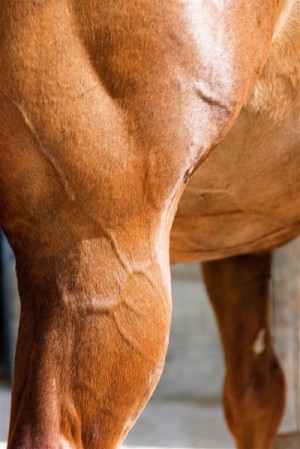Weekend Welcome from Kentucky Performance Products: Managing HYPP
Do you know the symptoms of HYPP (Hyperkalemic Periodic Paralysis) or how to treat it? KPP puts us in the know.
From the Kentucky Performance Products Tips & Topics Blog:

HYPP is an inherited muscle disease that disrupts normal muscle function. The genetic mutation interferes with the sodium channels that regulate muscle contractions. High blood potassium levels cause the sodium channel to stay open, allowing sodium to flood into the muscle cell. This causes uncontrollable muscle twitching. If the potassium levels get too high the muscles can become paralyzed.Some horses show little or no outward signs of HYPP, while others have severe attacks.
Symptoms to look for:
– Heavy sweating
– Third eyelid prolapsed (the third eyelid flickers over the eye)
– Sporadic muscle tremors, sometimes accompanied by respiratory sounds
– Muscle weakness ranging from mild to extreme (to the point of collapse)
– Whole-body shaking
Management tips:
HYPP horse should be maintained on a low-potassium diet and should be turned out as much as possible. If turn out is limited then they should be put on a program of regular light exercise. Regular exercise helps prevent attacks.
Excess potassium is excreted in the urine; therefore, it is important that horses remain properly hydrated. Provide the HYPP-positive horse with free-choice white salt to stimulate the thirst response, and an unlimited supply of fresh, clean water.
Proper nutritional is the key to keeping the potassium levels low: 0.3-0.4% potassium in the total diet for a horse that isn’t working much and .6 to .8% for horses in heavy training or competition. When creating a diet for your HYPP horse, consult a vet or nutritionist so they can help you properly balance the diet.
Examples of feed ingredients containing low levels of potassium:
- Beet pulp (without molasses)
- Corn and other vegetable oils
- Certain grains:
- oats
- corn
- barley
- wheat
- Soybean hulls
- Wheat midds
- Wheat bran
Examples of feed ingredients containing medium levels of potassium:
- Certain grass hay:
- brome
- clover
- costal bermudagrass
- fescue
- Kentucky bluegrass
- timothy grass
- Oat hay
- Stabilized rice bran
Examples of feed ingredients high in potassium:
- Alfalfa hay or cubes
- Canola oil
- Molasses
- Orchard grass
- Some electrolyte supplements
- Soybean meal
- Spring pasture
If you suspect your horse might be suffering from HYPP, a DNA test can confirm the diagnosis and your vet can recommend the best course of treatment.
Article written by KPP staff.
Copyright (C) 2014 Kentucky Performance Products, LLC. All rights reserved.
Article sponsored by Equi-Jewel, a high-fat, heat-stabilized rice bran; excellent source of safe calories that support proper muscle function, and by EndurExtra, a concentrated source of calories from fat with additional antioxidants and digestive aids.
When health issues arise, always seek the advice of a licensed veterinarian who can help you choose the correct course of action for your horse. Supplements are intended to maintain healthy systems and support recovery and healing. They are not intended to treat or cure illness or injury.
About Kentucky Performance Products, LLC:
Since 1998, Kentucky Performance Products has simplified a horse owner’s search for research-proven nutritional horse supplements that meet the challenges facing modern horses. KPP horse supplements target specific nutritional needs and are formulated to complement today’s feeds, thus safeguarding against over-supplementation. Each product is scientifically formulated and made with high-quality ingredients at certified manufacturing facilities. Kentucky Performance Products is proud to offer a quality assurance promise backed by a money-back guarantee. Kentucky Performance Products brings you horse supplements you can count on because the horse that matters to you, matters to us.








Leave a Comment